A A noun (from Latin nōmen

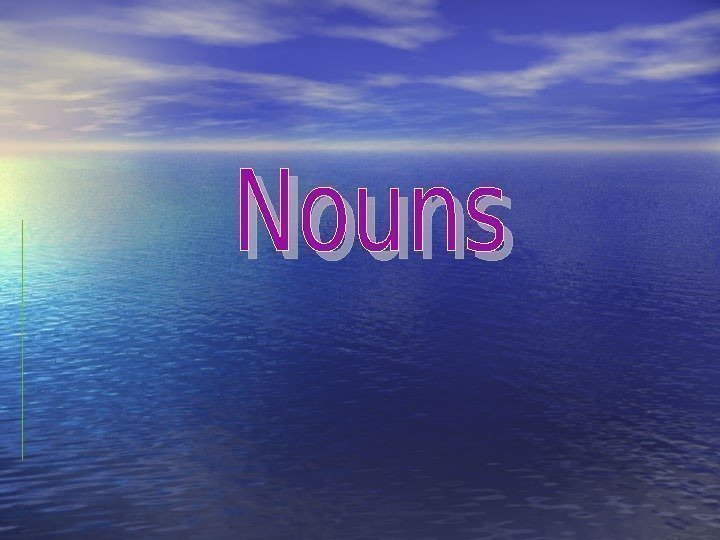
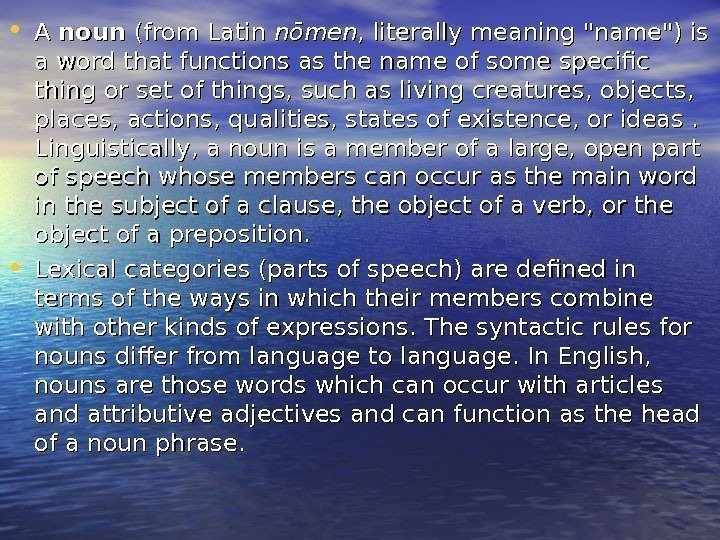
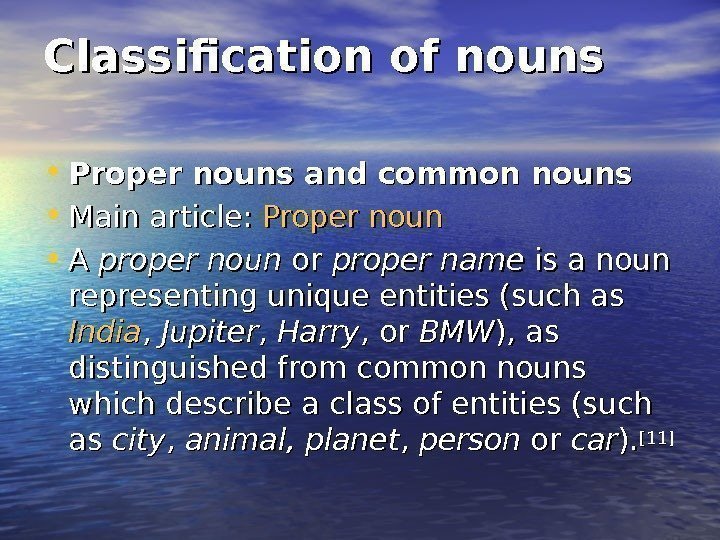
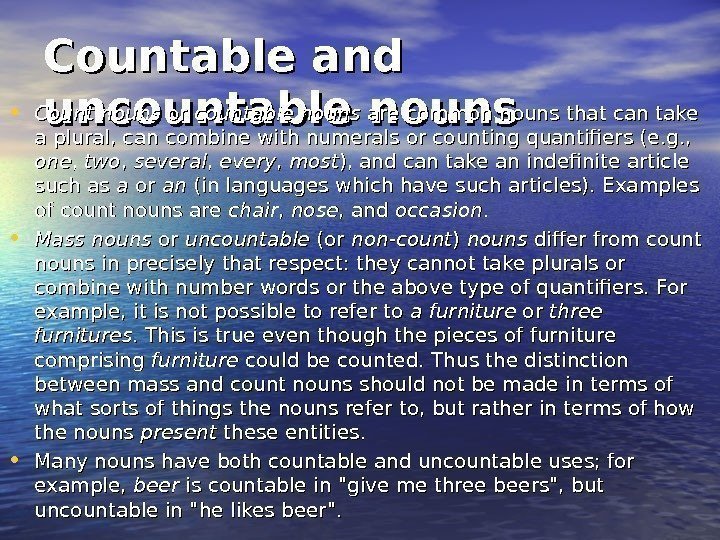
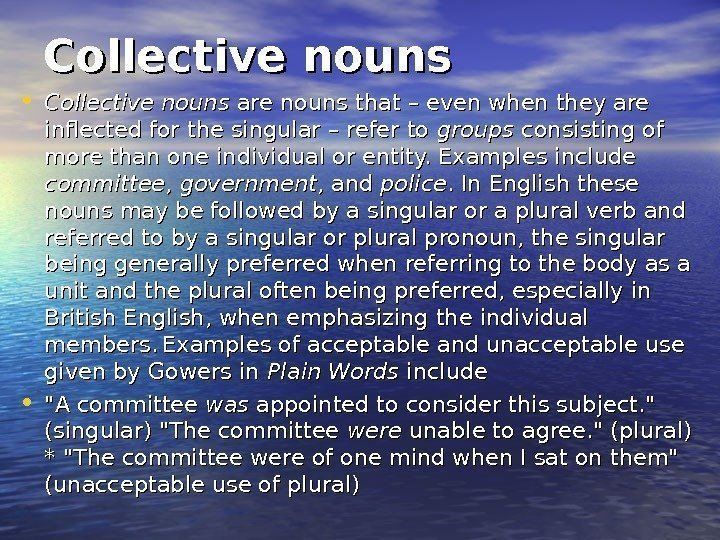
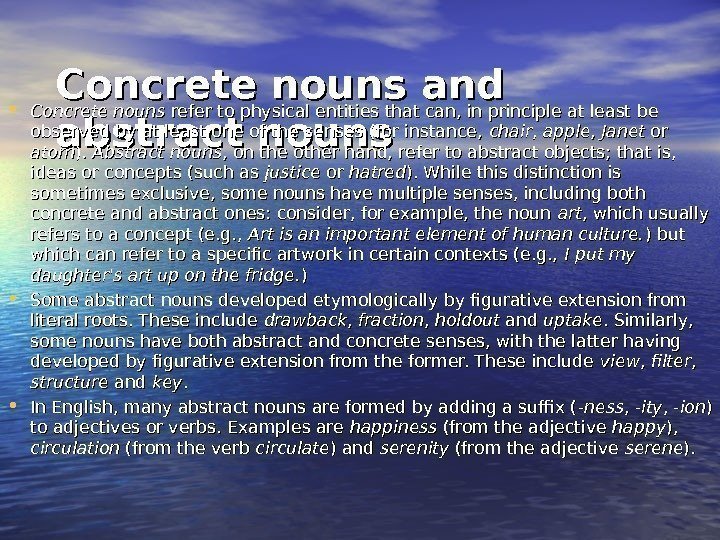
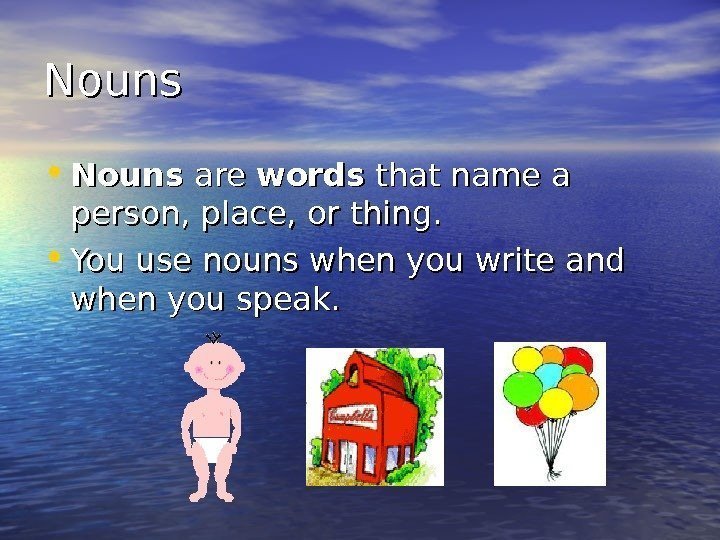
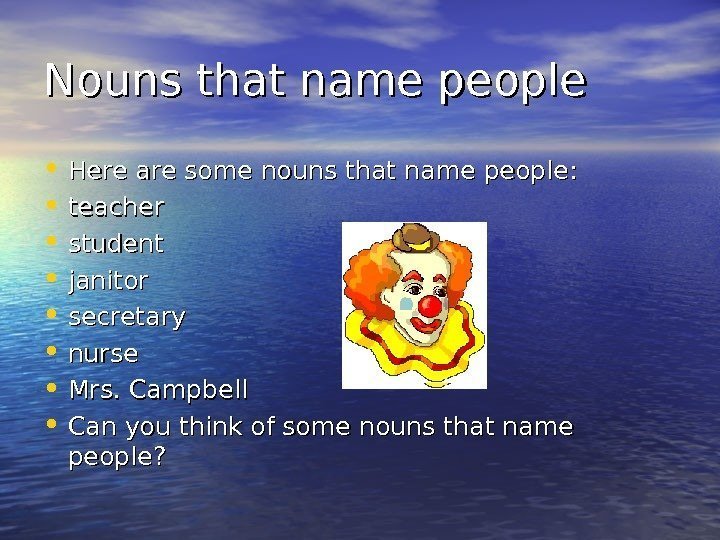
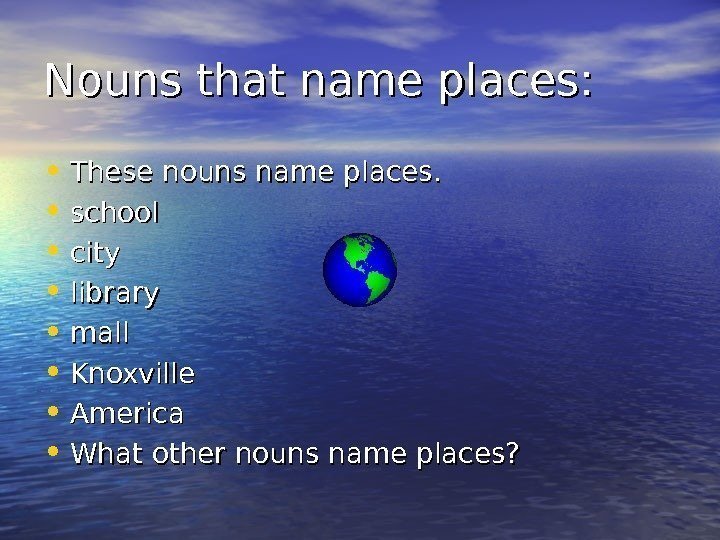
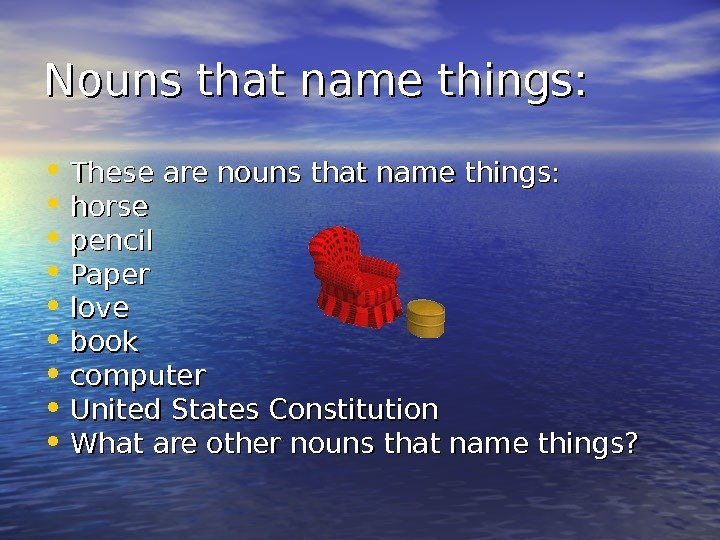
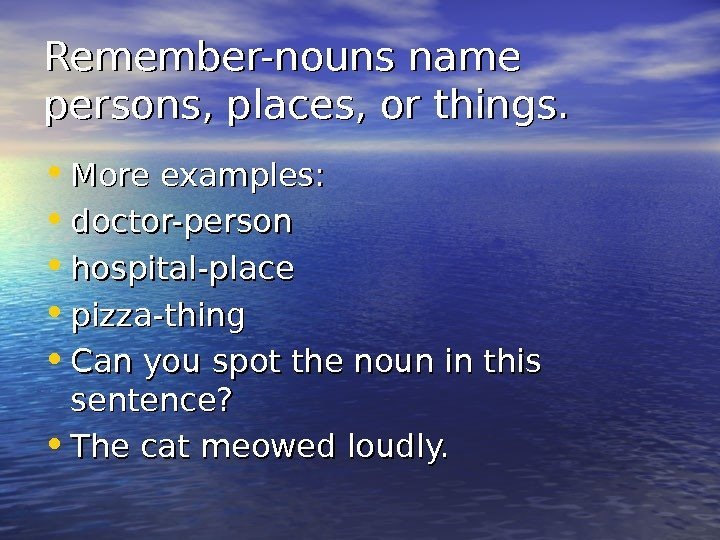
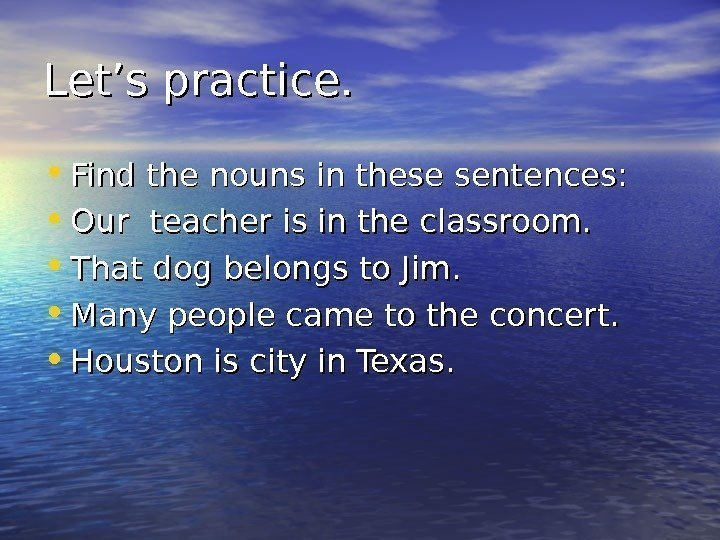
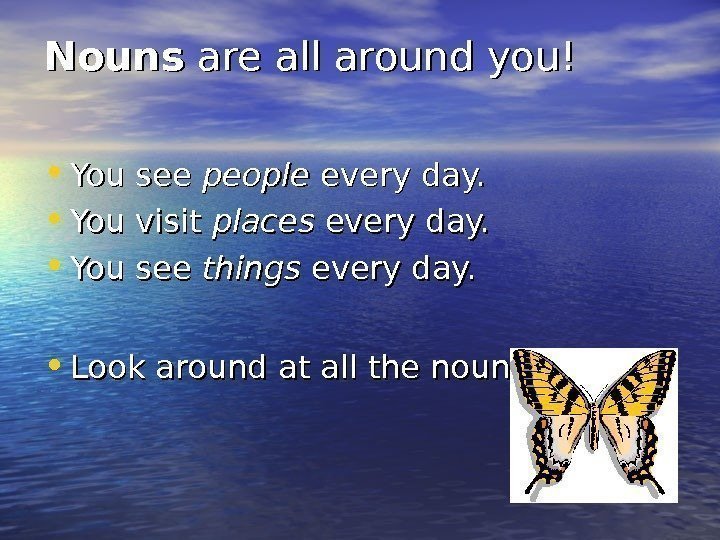
serikabeva__ghanar.ppt
- Размер: 1.0 Мб
- Автор:
- Количество слайдов: 13
Описание презентации A A noun (from Latin nōmen по слайдам

 • A A noun (from Latin nōmen , literally meaning «name») is a word that functions as the name of some specific thing or set of things, such as living creatures, objects, places, actions, qualities, states of existence, or ideas. Linguistically, a noun is a member of a large, open part of speech whose members can occur as the main word in the subject of a clause, the object of a verb, or the object of a preposition. • Lexical categories (parts of speech) are defined in terms of the ways in which their members combine with other kinds of expressions. The syntactic rules for nouns differ from language to language. In English, nouns are those words which can occur with articles and attributive adjectives and can function as the head of a noun phrase.
• A A noun (from Latin nōmen , literally meaning «name») is a word that functions as the name of some specific thing or set of things, such as living creatures, objects, places, actions, qualities, states of existence, or ideas. Linguistically, a noun is a member of a large, open part of speech whose members can occur as the main word in the subject of a clause, the object of a verb, or the object of a preposition. • Lexical categories (parts of speech) are defined in terms of the ways in which their members combine with other kinds of expressions. The syntactic rules for nouns differ from language to language. In English, nouns are those words which can occur with articles and attributive adjectives and can function as the head of a noun phrase.
 Classification of nouns • Proper nouns and common nouns • Main article: Proper noun • A A proper noun or or proper name is a noun representing unique entities (such as India , , Jupiter , , Harry , or BMWBMW ), as distinguished from common nouns which describe a class of entities (such as as city , , animal, planet , , person or or carcar ). ). [11]
Classification of nouns • Proper nouns and common nouns • Main article: Proper noun • A A proper noun or or proper name is a noun representing unique entities (such as India , , Jupiter , , Harry , or BMWBMW ), as distinguished from common nouns which describe a class of entities (such as as city , , animal, planet , , person or or carcar ). ). [11]
 Countable and uncountable nouns • Count nouns or or countable nouns are common nouns that can take a plural, can combine with numerals or counting quantifiers (e. g. , oneone , , twotwo , , several , , every , , most ), and can take an indefinite article such as aa or or anan (in languages which have such articles). Examples of count nouns are chair , , nose , and occasion. . • Mass nouns or or uncountable (or non-count ) ) nouns differ from count nouns in precisely that respect: they cannot take plurals or combine with number words or the above type of quantifiers. For example, it is not possible to refer to a furniture or or three furnitures. This is true even though the pieces of furniture comprising furniture could be counted. Thus the distinction between mass and count nouns should not be made in terms of what sorts of things the nouns refer to, but rather in terms of how the nouns present these entities. • Many nouns have both countable and uncountable uses; for example, beer is countable in «give me three beers», but uncountable in «he likes beer».
Countable and uncountable nouns • Count nouns or or countable nouns are common nouns that can take a plural, can combine with numerals or counting quantifiers (e. g. , oneone , , twotwo , , several , , every , , most ), and can take an indefinite article such as aa or or anan (in languages which have such articles). Examples of count nouns are chair , , nose , and occasion. . • Mass nouns or or uncountable (or non-count ) ) nouns differ from count nouns in precisely that respect: they cannot take plurals or combine with number words or the above type of quantifiers. For example, it is not possible to refer to a furniture or or three furnitures. This is true even though the pieces of furniture comprising furniture could be counted. Thus the distinction between mass and count nouns should not be made in terms of what sorts of things the nouns refer to, but rather in terms of how the nouns present these entities. • Many nouns have both countable and uncountable uses; for example, beer is countable in «give me three beers», but uncountable in «he likes beer».
 Collective nouns • Collective nouns are nouns that – even when they are inflected for the singular – refer to groups consisting of more than one individual or entity. Examples include committee , , government , and police. In English these nouns may be followed by a singular or a plural verb and referred to by a singular or plural pronoun, the singular being generally preferred when referring to the body as a unit and the plural often being preferred, especially in British English, when emphasizing the individual members. Examples of acceptable and unacceptable use given by Gowers in Plain Words include • «A committee waswas appointed to consider this subject. » (singular) «The committee were unable to agree. » (plural) * «The committee were of one mind when I sat on them» (unacceptable use of plural)
Collective nouns • Collective nouns are nouns that – even when they are inflected for the singular – refer to groups consisting of more than one individual or entity. Examples include committee , , government , and police. In English these nouns may be followed by a singular or a plural verb and referred to by a singular or plural pronoun, the singular being generally preferred when referring to the body as a unit and the plural often being preferred, especially in British English, when emphasizing the individual members. Examples of acceptable and unacceptable use given by Gowers in Plain Words include • «A committee waswas appointed to consider this subject. » (singular) «The committee were unable to agree. » (plural) * «The committee were of one mind when I sat on them» (unacceptable use of plural)
 Concrete nouns and abstract nouns • Concrete nouns refer to physical entities that can, in principle at least be observed by at least one of the senses (for instance, chair , , apple , , Janet or or atom ). ). Abstract nouns , on the other hand, refer to abstract objects; that is, ideas or concepts (such as justice or or hatred ). While this distinction is sometimes exclusive, some nouns have multiple senses, including both concrete and abstract ones: consider, for example, the noun artart , which usually refers to a concept (e. g. , Art is an important element of human culture. ) but which can refer to a specific artwork in certain contexts (e. g. , I put my daughter’s art up on the fridge. )) • Some abstract nouns developed etymologically by figurative extension from literal roots. These include drawback , , fraction , , holdout and uptake. Similarly, some nouns have both abstract and concrete senses, with the latter having developed by figurative extension from the former. These include view , , filter , , structure and keykey. . • In English, many abstract nouns are formed by adding a suffix ( -ness , , -ity , , -ion ) ) to adjectives or verbs. Examples are happiness (from the adjective happy ), ), circulation (from the verb circulate ) and serenity (from the adjective serene ). ).
Concrete nouns and abstract nouns • Concrete nouns refer to physical entities that can, in principle at least be observed by at least one of the senses (for instance, chair , , apple , , Janet or or atom ). ). Abstract nouns , on the other hand, refer to abstract objects; that is, ideas or concepts (such as justice or or hatred ). While this distinction is sometimes exclusive, some nouns have multiple senses, including both concrete and abstract ones: consider, for example, the noun artart , which usually refers to a concept (e. g. , Art is an important element of human culture. ) but which can refer to a specific artwork in certain contexts (e. g. , I put my daughter’s art up on the fridge. )) • Some abstract nouns developed etymologically by figurative extension from literal roots. These include drawback , , fraction , , holdout and uptake. Similarly, some nouns have both abstract and concrete senses, with the latter having developed by figurative extension from the former. These include view , , filter , , structure and keykey. . • In English, many abstract nouns are formed by adding a suffix ( -ness , , -ity , , -ion ) ) to adjectives or verbs. Examples are happiness (from the adjective happy ), ), circulation (from the verb circulate ) and serenity (from the adjective serene ). ).
 Nouns • Nouns are words that name a person, place, or thing. • You use nouns when you write and when you speak.
Nouns • Nouns are words that name a person, place, or thing. • You use nouns when you write and when you speak.
 Nouns that name people • Here are some nouns that name people: • teacher • student • janitor • secretary • nurse • Mrs. Campbell • Can you think of some nouns that name people?
Nouns that name people • Here are some nouns that name people: • teacher • student • janitor • secretary • nurse • Mrs. Campbell • Can you think of some nouns that name people?
 Nouns that name places: • These nouns name places. • school • city • library • mall • Knoxville • America • What other nouns name places?
Nouns that name places: • These nouns name places. • school • city • library • mall • Knoxville • America • What other nouns name places?
 Nouns that name things: • These are nouns that name things: • horse • pencil • Paper • love • book • computer • United States Constitution • What are other nouns that name things?
Nouns that name things: • These are nouns that name things: • horse • pencil • Paper • love • book • computer • United States Constitution • What are other nouns that name things?
 Remember-nouns name persons, places, or things. • More examples: • doctor-person • hospital-place • pizza-thing • Can you spot the noun in this sentence? • The cat meowed loudly.
Remember-nouns name persons, places, or things. • More examples: • doctor-person • hospital-place • pizza-thing • Can you spot the noun in this sentence? • The cat meowed loudly.
 Let’s practice. • Find the nouns in these sentences: • Our teacher is in the classroom. • That dog belongs to Jim. • Many people came to the concert. • Houston is city in Texas.
Let’s practice. • Find the nouns in these sentences: • Our teacher is in the classroom. • That dog belongs to Jim. • Many people came to the concert. • Houston is city in Texas.
 Nouns are all around you! • You see people every day. • You visit places every day. • You see things every day. • Look around at all the nouns!
Nouns are all around you! • You see people every day. • You visit places every day. • You see things every day. • Look around at all the nouns!

